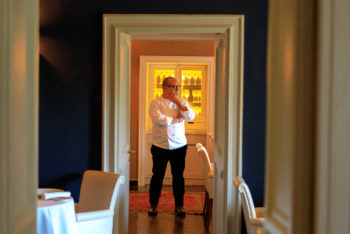
Every single morning of Ciccio Sultano
Gambero Rosso – Every single morning and evening, but also several times a day, the question I ask myself is not what to do. In fact, I don’t think that once the epidemic will be over I will be keen on finding another job nor do I think I could ever change my behaviour; at fifty years of age, it would be just like a joke. I cooked and got results so far, remaining curious, continuing to prepare myself, showing myself sincere even when it was not required. So with all my flaws, I won’t stop being a chef. Cleared the field from the shadow of an existential crisis (what shall I do?) The right question is how to do it? How to keep price and survival together. How to cross the costs of quality and service with the real possibilities of the demand. I don’t think that the desire to sit at a large table, where magic is performed from the first to the last moment, could disappear due to a more or less long quarantine.
Indeed, I am convinced of the contrary, the lack will increase the need. Maybe, it will happen as it already happened, that a young client, without great resources, puts aside something every month to treat himself to a special lunch or dinner.
Such determined, passionate and pure customers are the ones who give you the best energy to keep on going. You want to serve them, really, not to disappoint their dedication. Maybe this is already a clue on how to do it?
Chef and customer must be up to their respective tasks. They are accomplices, not duellists. How many times in the past few years have I had to witness improvised chefs’ challenges on the dishes without mentioning great, dark, sommeliers?
Complicity and dedication. It has something conventual in it, but it doesn’t look bad. For someone who has no prejudices but only the desire to satisfy the pleasure of the table, to know, to share, the most suitable term for such an experience is “invitation”.
Tomorrow, going to the restaurant will be like responding to an invitation. An invitation that chance or curiosity offers you and that must be honoured not to show off it, as for an elegant habit, to gain weight, but for gratitude towards life.
And the gratitude for this new type of chef (and cuisine) will have to do with two noble feelings, priceless, mutual dedication and complicity. There will be fewer tables, more distance from one to the other, less exaggerated menus, different forms of payment, an always impeccable service that borders on sweetness and only a few prizes that are truly worth the challenge. The opportunities to raise your voice, to increase the chatter, to bore others, the recipes of the aunt, of the revolutionary chef, the grand and small speeches will decrease. You will laugh and cry not on command.
We will certainly be amazed to start again, even moved, but certainly what we could not bear is that in the customers’ and in our behaviour there could appear a presumptuous easiness, the culture of hearsay and free sneer, which are the opposite of dedication and complicity. Finally, the answer to how to do it? is doing better than before with what will be there, because simplicity is difficult; triumph not through quantity, but with availability, invention, affection. Cooking is transforming all that is palatable. Going to the restaurant will cost what is fair in that moment and for that service, but it will be again and we hope forever an invitation that life offer you.
Before the chaos, I finished writing the second Notebook of the Cantieri Sultano series, a Vademecum on how to design a restaurant.
I will add a chapter on how to deal with an emergency. Photo: Alberto Blasetti
